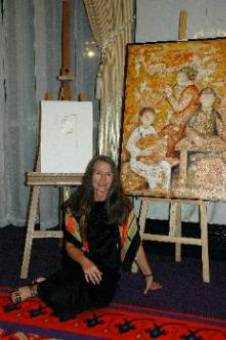Diana Woodcock
2007 Creekwalker Poetry Prize Winner

Diana Woodcock’s first full-length collection, Swaying on the Elephant’s Shoulders, was published by Little Red Tree Publishing in 2011. Nominated for a Pushcart Prize for the title poem in Travels of a Gwai Lo, she has been teaching at Virginia Commonwealth University/School of the Arts in Qatar since 2004. Prior to that, she lived and worked in Tibet, Macau and Thailand. Her poems have appeared in Best New Poets 2008 (selected by Mark Strand), Nimrod, Crab Orchard Review, Atlanta Review, Southern Humanities Review, and other journals and anthologies. In May 2010, her poetry was exhibited with Li Chevalier’s paintings at the Today Art Museum in Beijing, China.
Her chapbooks include In the Shade of the Sidra Tree (Finishing Line Press, 2010), Mandala (Foothills Publishing, 2009) and Travels of a Gwai Lo (Toadlily Press, 2009)
Her chapbooks include In the Shade of the Sidra Tree (Finishing Line Press, 2010), Mandala (Foothills Publishing, 2009) and Travels of a Gwai Lo (Toadlily Press, 2009)
SPARSE
Sparks scattered in the ground,
the seed begins its journey.
The dew grows cold while the Hunter’s
Moon stalks fallow fields, rotting gourds.
Beside it, solitary Fomalhaut shines.
Gates between the realms of life and death
swing open.
Today a sleepy orange, last sulphur of the
season, dartled between three lingering
lantana blossoms on the wood edge—my days
just as numbered. Titmice and blue jays squabbled
at the birdbath as the one cloud in the sky became
the baby wrapped in white, floating down Lhasa’s
river toward her burial.
Unable to turn away that day years ago, I
chose to stay and watch the white bundle
diminish to a mere speck, then vanish.
On the riverbank, homeless peasants and
pilgrims with their yaks meandered among
tents and cooking fires, their children playing
games as the corpse passed by. Too old for
water burials, they all would be given the sky.
In the east before dawn, Venus and elusive
Mercury side by side. I am a seed, a spark,
a speck.
Originally published in Blue Fifth Review, Fall 2006
JUST FOR ONCE
Just for once
try being as fluid
as ice melting.
Cease bucking change.
Try believing
you have all you need
and your soul is immense.
Try simply seeing things
as they are,
watching without judging--
without fearing--
the cobra.
Try keeping as still
as the egret who stands
in perfect quiescence
among sacred lotus flowers,
and consider how the Atlas moth,
though its majestic wings stretch out
one foot in length, emerges to live
just one day.
Originally published in White Heron, 2003
STREAKED-WINGED RED SKIMMER
The dragonfly lingers
on the brown tip of a summer
green reed like a flame
on a candle at mass.
Poison has spoiled its meal
of midges and broken its eggs.
The last of its kind
to inhabit this shoreline,
it hangs on,
burns in the mid-day sun,
purifying the day.
No longer skimming
its lake, it poses on its reedy
throne—a lone ember
glowing in the fumes
of Malathion.
Originally published in Least-loved Beasts of the Really Wild West, Native
West Press (anthology, Spring 1997)
DESERT BIRDS
First thing I did was to set out a bowl of
fresh water, hoping to entice them.
Six weeks and no sightings, no sound.
Finally one morning squabbling among
ubiquitous house sparrows on the roof.
Awakened from sleep, I lay in bed smiling.
Encouraged, I listened more closely.
At sunset parakeets—ring-necked—noisily
squawking, I’m passing over.
In date palms, white-cheeked bulbuls.
In acacias, collared and palm doves cooingly
boasting of colonizing this Gulf desert.
I could wonder all day why any bird would
stay in these arid conditions—how
anything could thrive. I could seek out the
sheikhs, look for answers in the Koran or
eyes of veiled women in the streets,
meditate from dusk till dawn beside a wadi.
But I prefer asking black-winged stilts in the
reeds by the pond at the date farm, and grey
francolins—squat, stub-tailed—along the
verges why we all have these urges to explore
new lands, to stay when conditions are so
inhospitable and poor.
Originally published in Brooklyn Review, Spring 2007
CHOOSING A DESERT
When you decide the time has come for a move
to the desert, consider this one: peninsula with Arabian
Gulf waters on three sides, an inland sea, flamingos in the
shallows, songs of that Persian nightingale—the white-
cheeked bulbul—pure magical
incantations, the sidra tree spreading its branches like
arms raised in praise. In the silence and solitude, you’ll
learn to love your neighbor for who he is—not
what he claims to be. In this harsh place, you’ll
find within yourself the grace of gentleness.
Sea lavender will draw you to saline flats you might
otherwise avoid, moorhen and crakes to sewage lagoons
hidden by tall green reeds. You’ll grow so accustomed
to arid flat tan terrain till you’ll feel like an alien
in lush mountains and rain. You’ll settle in,
but once in a while the cloud-moving wind will stir the
chords of vagabondage, and you’ll long for a mountain stream
and the woodsong. You’ll thirst for rain—day-long rain,
rain that drenches your dreams all night. You’ll miss birches
and mushrooms. But there’s a seamlessness in all this
barrenness—a sand-brown transience that shouldn’t be
missed: quiet inlets with gentle ripples, springtime with desert
hyacinths blossoming, the season of mists when desert scrub
drips with moisture. This is the place to enter the cloister of your
own design—take all the time you need to simply be.
Originally published in Quercus Review, April/May 2007
© All Poetry Copyright Diana Woodcock. All rights reserved.